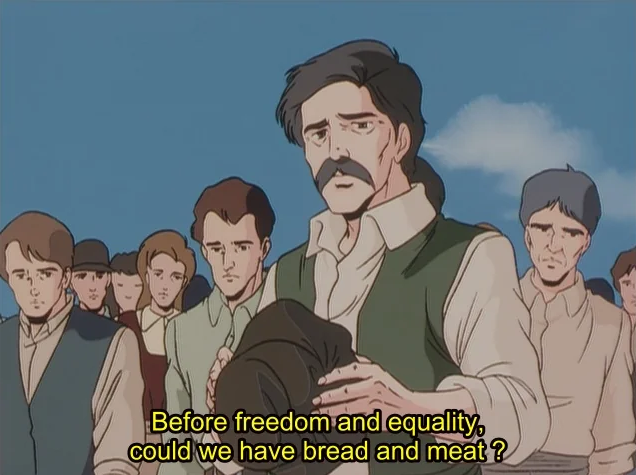
Like many shows that center around war, it’s represented as a tremendously tragic thing, even when it may be justified. LoGH isn’t shy about showing the horrific military casualties throughout the series, which range from tragic to grotesquely brutal. We also get to see the victims of Reinhard’s scorched-earth policy during the Alliance’s invasion of the Empire lead to widespread starvation and misery.
These grim scenes beg the question – is this worth it? If we believe that the causes of this war are just, is it worth the human toll it begets? Surely, protecting democracy (or conversely, uniting humanity) can be seen as causes worth dying for, but as the bodies pile up, they begin to seem more and more like lofty goals built on impractical ideals. in the show, Reinhard and Yang are able to skirt by without taking too much obvious responsibility for this - mostly due to their ostensible concern for their soldiers’ well-being, in contrast with the FPA in general and the Goldenbaums. However, concern alone does not resolve them of sin - no matter which angle you try to see it from, they still caused millions of deaths.
Our resident philosopher, Yang, often opines on the nature of war. He takes the opinion that “war is rarely good versus evil – rather, it’s usually one good versus another good,” – a matter of human misunderstanding, and a failure of diplomacy to resolve disagreements as it should. Though he considers himself something of a pacifist, any hesitations he has about putting countless lives in danger are trumped by his undying devotion to democracy. However, we see him haunted by the millions that die on both sides as a result of his tactics - it’s no secret that he is disgusted by the toll war takes. A potent example of this is when his foes at the capture of Iserlohn charge into an “honorable defeat” when it is clear they have already lost – “It’s people like you that are the reason the war will never end!”, he shouts in frustration at the enemy general’s order.
While the justification for wars will always end up a matter of personal opinion, LoGH does a good job of displaying the senselessness of war in general, and how soldiers and civilians alike suffer at the hands of its destruction.